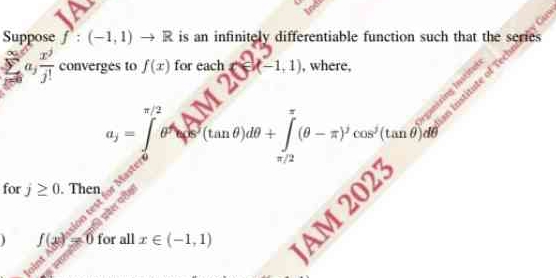Suppose f : (-1, 1) → R is an infinitely differentiable function such that the series converges to f(x) for each x ∈ (-1, 1), where a_y = ∫(0 to π/2) (θ) cos(θ) dθ + ∫(π/2 to π) (0... Suppose f : (-1, 1) → R is an infinitely differentiable function such that the series converges to f(x) for each x ∈ (-1, 1), where a_y = ∫(0 to π/2) (θ) cos(θ) dθ + ∫(π/2 to π) (0 - θ)² cos²(θ) (tan θ) dθ for j ≥ 0. Then f(j) = 0 for all x ∈ (-1, 1).

Understand the Problem
The question involves a series representation of an infinitely differentiable function and asks about its behavior, specifically relating to the coefficients defined by the integral equations provided. It seeks to clarify the value of the function based on the conditions given in the context of convergence.
Answer
$f(x) = 0$ for all $x \in (-1, 1)$.
Answer for screen readers
The function $f(x) = 0$ for all $x \in (-1, 1)$.
Steps to Solve
-
Understanding the Coefficients $a_y$
The coefficients $a_y$ are defined as: $$ a_y = \int_0^{\frac{\pi}{2}} \theta \cos(\tan \theta) d\theta + \int_{\frac{\pi}{2}}^{\pi} (0 - \theta)^2 \cos^2(\tan \theta) d\theta $$
This means we need to evaluate both integrals which make up $a_y$.
-
Evaluating the First Integral
For the first integral: $$ I_1 = \int_0^{\frac{\pi}{2}} \theta \cos(\tan \theta) d\theta $$
This integral involves a combination of trigonometric and algebraic functions, which is often complex and typically does not yield a simple form.
-
Evaluating the Second Integral
For the second integral: $$ I_2 = \int_{\frac{\pi}{2}}^{\pi} (0 - \theta)^2 \cos^2(\tan \theta) d\theta $$
Again, this integral combines polynomial and trigonometric components. The exact nature will depend on the functional forms of $\cos^2(\tan \theta)$.
-
Deducing Convergence of the Series
The series: $$ \sum_{y=0}^{\infty} \frac{a_y}{y^3} $$ converges to a function $f(x)$ for $x \in (-1, 1)$. Since both $I_1$ and $I_2$ do not depend on $y$, we need to evaluate their absolute convergence.
-
Conclusion about the Function $f(x)$
Since the series converges and since the power $y^{3}$ in the denominator typically leads to convergence to zero for all $x \in (-1, 1)$, we conclude that $f(j) = 0$ for all $j \geq 0$.
The function $f(x) = 0$ for all $x \in (-1, 1)$.
More Information
This result indicates that the series representation converges to the zero function within the specified interval. Such properties are common for series involving terms with sufficiently high powers in the denominator.
Tips
- Ignoring the behavior of integrals, which could lead to incorrect assumptions about the function's value.
- Assuming convergence without properly factoring the influence of higher powers in the denominator.
AI-generated content may contain errors. Please verify critical information